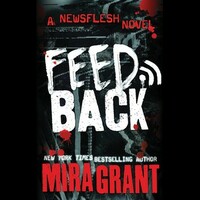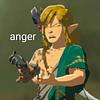You need to sign in or sign up before continuing.
Take a photo of a barcode or cover
I wanted badly to LOVE this one, because I loved the first three. Unfortunately it kind of fell flat for me. I love the character of Ash, but didn't really care for any of the others. It only got good for me closer to the end, when they were in the Maze, and that didn't last long enough for my liking.
I didn't HATE it, it just seemed to be lacking something.
I didn't HATE it, it just seemed to be lacking something.
I probably would have given this one a higher rating if the part about the Maze cult/ Clive had been cut. That section just seemed to be page filler and the Maze leader seemed like a knock off of Negan from The Walking Dead.
Other than that part I really really enjoyed the book and loved the characters!
Other than that part I really really enjoyed the book and loved the characters!
I have finally gotten around to reading this installment to the Newsflesh world. This book runs parallel to the first book in the original trilogy, Feed.
I absolutely love the original trilogy, they are up there on the list of favourite books ever. I have had this companion novel for a good while, and because I reread of the others, I thought it was a good idea to finally read this one!
I very much love this world, so being back in it, with fresh new chatacters made me happy. I loved the core group in this one. My favourite had to be Ash, she had me cracking up. She's badass and absolutely hilarious. Mat I absolutely adored, and they're most definitely on the list of fictional character I'd be besties with. Also... I absolutely love the diversity and representation in this book!!! *chef's kiss*
We had some deaths that broke my heart. One was a fave (I'm still not over it) and the other was someone who I wish we got to know more.
Storywise, it was pretty great, it was mostly a rehash of the first book but from another viewpoint. I liked that these characters, compared to the Masons, were the complete opposite, handling the story differently. It was a little repetitive at times but it was nice to see how it all lined up and connected. What deducted a star was how kinda rushed and flat the last part was. It wasn't bad, just didn't seem to follow the pace of the beginning of the book. Plus I didn't really like the Clive section. Action scenes were great though, Ash kicked arse!
Summary: Did I love this one as much as the original trilogy? No. Did I still enjoy it and have a good time? Yes!
I will need to check out Rise at some point to read all the novellas I've missed.
I absolutely love the original trilogy, they are up there on the list of favourite books ever. I have had this companion novel for a good while, and because I reread of the others, I thought it was a good idea to finally read this one!
I very much love this world, so being back in it, with fresh new chatacters made me happy. I loved the core group in this one. My favourite had to be Ash, she had me cracking up. She's badass and absolutely hilarious. Mat I absolutely adored, and they're most definitely on the list of fictional character I'd be besties with. Also... I absolutely love the diversity and representation in this book!!! *chef's kiss*
We had some deaths that broke my heart. One was a fave (I'm still not over it) and the other was someone who I wish we got to know more.
Storywise, it was pretty great, it was mostly a rehash of the first book but from another viewpoint. I liked that these characters, compared to the Masons, were the complete opposite, handling the story differently. It was a little repetitive at times but it was nice to see how it all lined up and connected. What deducted a star was how kinda rushed and flat the last part was. It wasn't bad, just didn't seem to follow the pace of the beginning of the book. Plus I didn't really like the Clive section. Action scenes were great though, Ash kicked arse!
Summary: Did I love this one as much as the original trilogy? No. Did I still enjoy it and have a good time? Yes!
I will need to check out Rise at some point to read all the novellas I've missed.
This was a nice addition to the world Mira Grant built with the Newsflesh series; I definitely love the original trilogy more, though.
I loved this book! It was so exciting the re-enter the Newsflesh world. I loved the slightly more motley crew just as much as I loved the well-oiled machine of the Masons. I would welcome more books in the series but Feedback seemed pretty concluded at the end. So I will just keep my eyes open for any short stories.
I adore the post-Rising, needle-pricking, political mudslinging, conspiracy theory chasing, kick-butt blogging world of Mira Grant's. So I was thrilled to find out that she was writing a new installment in the Newsflesh world.
That being said, if you have not read Feed, Deadline, and Blackout, you can still enjoy this novel. No previous zombie experience required. However, Feedback parallels the events in Feed, so when several events of consequence occur, you will be spoiling yourself for that original tale. If you think you want to read all of the novels in this series, then I would proceed in the order of publication.
In this story, we're following the bloggers who are chosen by Governor Susan Kilburn's political campaign to follow her, one of the Democratic hopefuls for the presidential nomination in 2040.
And this group of bloggers is diverse.
Ash, the narrator, is an Irish lesbian whose love of zombie stalking, baiting, and hunting land her in a mental institution. Her parents committ her. She's rescued by an African-American blogger who writes copiously on inequality. Ultimately, he marries her and she becomes a United States citizen.
Nothing more is said about Ash's parents other than they have restricted access. Basically, there's a teenager who is not understood by her parents, rebels, parents freak out, and the young adult decides to cut off ties.
At first, this solution just felt emotionally stunted to me. If I were a parent and my daughter enjoyed killing zombies and was continuously putting her life in peril, I'm not certain that I would have acted differently.
But one of the themes Grant explores is the notion of family. By cutting off ties to her family, Ash's inability to deal with emotional issues is placed front and center. And this key flaw plays a role in the future of her chosen family. This decision also allows Grant to build a cast of misfit bloggers.
Misfit blogger #2 is the African-American Newsie Ben Ross. I felt for Ben. He wants everyone to do the right thing. How hard is it to follow the rules? Can't we be kind to one another? What about community? What about watching out for one another?
Every time the world acts like the self-centered bunch of knucklehead cretins we tend to be, Ben's disappoint is palpable. His earnestness is true. And he is a fantastic foil to Ash.
“I could craft a fabulous narrative from that, and let Ben have the dry, boring bits about civic responsibility and crumbling infrastructure—the sort of thing that got the older generation’s engines revving, as they continued to think of the world as something we could reclaim one day, and not just something to survive. He looked at zombies and saw a walking metaphor for man’s inhumanity to man. I saw zombies. I liked it that way.”
The next misfit is Mat, a genderfluid person who generally prefers gender neutral pronouns. Mat is fluid with their identification in career choices and interests as well. They are the technical genius the group needs who also posts videos with make-up and fashion tips.
Finally, there is Audrey, an Asian lesbian who is the group's Fictional finding a niche market writing pre-Rising crime sagas. Audrey never leaves the house if she can help it. A decision I can relate to. Initially her background is teased as a gray area so that we may discover her deep dark secrets. She's also pretending to carry on a polyamorous relationship with Ben and Ash, so that she may date Ash as Ash applies for U.S. citizenship.
I loved these characters for who they were on the page and what Grant had them doing. They're following Kilburn, in part, because it's a job, but also because they want to truthfully report on the political maneuverings in the primary and Presidential races. It's important to them to get the story right.
They are also a family unit. A family they chose. And Grant has a few moments where she seamlessly interjects her opinion on a number of issues, including social justice. The quote below is from Ash recalling her reaction to meeting Mat.
“With Mat, I had about five minutes to decide whether I was going to embrace the singular ‘they,’ or be one more in the long line of assholes who had looked at someone else’s life choices and said, ‘nah, my comfort matters more.’”
And then there are the times where the awkwardness of inserted political views threw me out of the story. Here's Ash getting nervous about police showing up to check out what she's doing. She's recalling life before the Rising.
“Reaching into a bag while under police surveillance was likely to be interpreted as reaching for a gun—and back then, just having a firearm in the presence of the cops was considered a totally valid reason for them to start shooting. If the Rising hadn’t happened when it did, the police would probably have triggered a civil war.”
Really? The police trigger a civil war? Probably? That's a jarring statement that pulls me completely out of the post-Rising world and back into our world. And we certainly have problems, but to make this gross generalization is irresponsible. There are some police officers who abuse their power, but to use words in such an inflammatory manner is an abuse of an author's power.
Interestingly, Grant also writes about reasonableness. She's a more balanced writer when she's considering economic disparity.
“The country has been in a state of high economic inequality since before the Rising. Some people have even gone so far as to say that is caused the Rising, since a lack of trust for authority and the media helped motivate the Mayday Army to release Dr. Kellis’s yet-untested cure into the atmosphere. So it would have been reasonable to think that maybe after the dead walked, things would get better for the living poor.
Being reasonable doesn’t make a thing true. Sadly.”
This concept that economic inequality could have contributed to the zombie apocalypse is much more compelling. And I think worthy of discussions about both the literal plot meaning and the symbolic undertones.
She also writes a revealing scene where Ash, as an Irishwoman who knows her alcohol, has riffled through another political allies' liquor cabinet. Ash determines that the alcohol is mid-priced, and that Congresswoman Wagman is kind.
“Rick looked dubious. ‘What if it had been the really fancy stuff? The three-hundred-dollar stuff?’
'That would tell me she didn’t stock her own bar, and was either too disconnected from the common man to know that you don’t need to pay that much for basic social drinking, or was trying to impress people with how generous she was. Neither of those buys you many points in m book.’ I put the bourbon back under the bar before leaning forward, resting my weight on my elbows and smiling at him. ‘Sometimes the middle of the road is the only decent place to be.’”
Now that's an interesting observation. Turns out that Wagman is a Republican, but leans left. Sounds pretty middle of the road reasonable for finding common ground to get things done.
I do find it curious that Grant chooses to characterize a Republican politician as the one compromising. Is Grant saying that Republicans are the ones who need to compromise or that Republicans are better at compromising or something else?
As I read these scenes where Grant's political views seep through, I also considered the political correctness of the character list. It almost felt like Grant was checking off character diversity just to anger people on the right.
Got an African-American? Need one. Preferably male. Check!
Got an Asian? Yes!
Got a lesbian? Right here!
What about someone who's bi-sexual? Indeed!
And don't forget a genderfluid character! Got one!
I'm not irritated by the presence of these diverse characters; I'm irritated by how sometimes their presence feels forced, unnatural. And again, this artificial feeling pulls me out of this world.
I'm going to chalk this up to Grant's writing style. In previous books, I've read reviews where people have complained about Grant repeating herself. Like the constant needle-pricking and blood testing to make sure you're human. Since those details are completely fictional, I gloss right over them. I was never bothered by this echo effect.
However, with these characters I was. Grant repeatedly reminds us that Mat prefers gender neutral pronouns. She reminds us that many people find using gender neutral pronouns awkward.
Yep. Yep I do. But I am capable of trying and over time I will get it. I am not perfect and if you expect me to be, then you will be disappointed.
What's maddening to me, though, is that Grant so effectively gives the one zinger. She has Ash perfectly frame why respecting someone's pronoun choice is important. Ash doesn't want to be the asshole who puts her own comfort over the life choices of another. That one statement builds more empathy from me than any of the other reminders.
And Mat is a fantastic character. They help their friends, even when performing field duties that they really aren't qualified for. They are skeptical about a good number of things and fact check and do background checks to protect their family. They have a wicked sense of humor.
And when I see a few characters intentionally using the wrong pronoun when referring to Mat, I'm irate! Do *NOT* insult my friend like that!
And these characters are all close friends. Once a certain political event occurs, the rest of the story is up for grabs. The events in the falling action and resolution took me by surprise. And I loved that!
This story about finding happiness and the all-American dream is narrated by an Irish immigrant, and centers around a diverse group of people who choose to be each other's family. There's all the messaging I need.
That being said, if you have not read Feed, Deadline, and Blackout, you can still enjoy this novel. No previous zombie experience required. However, Feedback parallels the events in Feed, so when several events of consequence occur, you will be spoiling yourself for that original tale. If you think you want to read all of the novels in this series, then I would proceed in the order of publication.
In this story, we're following the bloggers who are chosen by Governor Susan Kilburn's political campaign to follow her, one of the Democratic hopefuls for the presidential nomination in 2040.
And this group of bloggers is diverse.
Ash, the narrator, is an Irish lesbian whose love of zombie stalking, baiting, and hunting land her in a mental institution. Her parents committ her. She's rescued by an African-American blogger who writes copiously on inequality. Ultimately, he marries her and she becomes a United States citizen.
Nothing more is said about Ash's parents other than they have restricted access. Basically, there's a teenager who is not understood by her parents, rebels, parents freak out, and the young adult decides to cut off ties.
At first, this solution just felt emotionally stunted to me. If I were a parent and my daughter enjoyed killing zombies and was continuously putting her life in peril, I'm not certain that I would have acted differently.
But one of the themes Grant explores is the notion of family. By cutting off ties to her family, Ash's inability to deal with emotional issues is placed front and center. And this key flaw plays a role in the future of her chosen family. This decision also allows Grant to build a cast of misfit bloggers.
Misfit blogger #2 is the African-American Newsie Ben Ross. I felt for Ben. He wants everyone to do the right thing. How hard is it to follow the rules? Can't we be kind to one another? What about community? What about watching out for one another?
Every time the world acts like the self-centered bunch of knucklehead cretins we tend to be, Ben's disappoint is palpable. His earnestness is true. And he is a fantastic foil to Ash.
“I could craft a fabulous narrative from that, and let Ben have the dry, boring bits about civic responsibility and crumbling infrastructure—the sort of thing that got the older generation’s engines revving, as they continued to think of the world as something we could reclaim one day, and not just something to survive. He looked at zombies and saw a walking metaphor for man’s inhumanity to man. I saw zombies. I liked it that way.”
The next misfit is Mat, a genderfluid person who generally prefers gender neutral pronouns. Mat is fluid with their identification in career choices and interests as well. They are the technical genius the group needs who also posts videos with make-up and fashion tips.
Finally, there is Audrey, an Asian lesbian who is the group's Fictional finding a niche market writing pre-Rising crime sagas. Audrey never leaves the house if she can help it. A decision I can relate to. Initially her background is teased as a gray area so that we may discover her deep dark secrets. She's also pretending to carry on a polyamorous relationship with Ben and Ash, so that she may date Ash as Ash applies for U.S. citizenship.
I loved these characters for who they were on the page and what Grant had them doing. They're following Kilburn, in part, because it's a job, but also because they want to truthfully report on the political maneuverings in the primary and Presidential races. It's important to them to get the story right.
They are also a family unit. A family they chose. And Grant has a few moments where she seamlessly interjects her opinion on a number of issues, including social justice. The quote below is from Ash recalling her reaction to meeting Mat.
“With Mat, I had about five minutes to decide whether I was going to embrace the singular ‘they,’ or be one more in the long line of assholes who had looked at someone else’s life choices and said, ‘nah, my comfort matters more.’”
And then there are the times where the awkwardness of inserted political views threw me out of the story. Here's Ash getting nervous about police showing up to check out what she's doing. She's recalling life before the Rising.
“Reaching into a bag while under police surveillance was likely to be interpreted as reaching for a gun—and back then, just having a firearm in the presence of the cops was considered a totally valid reason for them to start shooting. If the Rising hadn’t happened when it did, the police would probably have triggered a civil war.”
Really? The police trigger a civil war? Probably? That's a jarring statement that pulls me completely out of the post-Rising world and back into our world. And we certainly have problems, but to make this gross generalization is irresponsible. There are some police officers who abuse their power, but to use words in such an inflammatory manner is an abuse of an author's power.
Interestingly, Grant also writes about reasonableness. She's a more balanced writer when she's considering economic disparity.
“The country has been in a state of high economic inequality since before the Rising. Some people have even gone so far as to say that is caused the Rising, since a lack of trust for authority and the media helped motivate the Mayday Army to release Dr. Kellis’s yet-untested cure into the atmosphere. So it would have been reasonable to think that maybe after the dead walked, things would get better for the living poor.
Being reasonable doesn’t make a thing true. Sadly.”
This concept that economic inequality could have contributed to the zombie apocalypse is much more compelling. And I think worthy of discussions about both the literal plot meaning and the symbolic undertones.
She also writes a revealing scene where Ash, as an Irishwoman who knows her alcohol, has riffled through another political allies' liquor cabinet. Ash determines that the alcohol is mid-priced, and that Congresswoman Wagman is kind.
“Rick looked dubious. ‘What if it had been the really fancy stuff? The three-hundred-dollar stuff?’
'That would tell me she didn’t stock her own bar, and was either too disconnected from the common man to know that you don’t need to pay that much for basic social drinking, or was trying to impress people with how generous she was. Neither of those buys you many points in m book.’ I put the bourbon back under the bar before leaning forward, resting my weight on my elbows and smiling at him. ‘Sometimes the middle of the road is the only decent place to be.’”
Now that's an interesting observation. Turns out that Wagman is a Republican, but leans left. Sounds pretty middle of the road reasonable for finding common ground to get things done.
I do find it curious that Grant chooses to characterize a Republican politician as the one compromising. Is Grant saying that Republicans are the ones who need to compromise or that Republicans are better at compromising or something else?
As I read these scenes where Grant's political views seep through, I also considered the political correctness of the character list. It almost felt like Grant was checking off character diversity just to anger people on the right.
Got an African-American? Need one. Preferably male. Check!
Got an Asian? Yes!
Got a lesbian? Right here!
What about someone who's bi-sexual? Indeed!
And don't forget a genderfluid character! Got one!
I'm not irritated by the presence of these diverse characters; I'm irritated by how sometimes their presence feels forced, unnatural. And again, this artificial feeling pulls me out of this world.
I'm going to chalk this up to Grant's writing style. In previous books, I've read reviews where people have complained about Grant repeating herself. Like the constant needle-pricking and blood testing to make sure you're human. Since those details are completely fictional, I gloss right over them. I was never bothered by this echo effect.
However, with these characters I was. Grant repeatedly reminds us that Mat prefers gender neutral pronouns. She reminds us that many people find using gender neutral pronouns awkward.
Yep. Yep I do. But I am capable of trying and over time I will get it. I am not perfect and if you expect me to be, then you will be disappointed.
What's maddening to me, though, is that Grant so effectively gives the one zinger. She has Ash perfectly frame why respecting someone's pronoun choice is important. Ash doesn't want to be the asshole who puts her own comfort over the life choices of another. That one statement builds more empathy from me than any of the other reminders.
And Mat is a fantastic character. They help their friends, even when performing field duties that they really aren't qualified for. They are skeptical about a good number of things and fact check and do background checks to protect their family. They have a wicked sense of humor.
And when I see a few characters intentionally using the wrong pronoun when referring to Mat, I'm irate! Do *NOT* insult my friend like that!
And these characters are all close friends. Once a certain political event occurs, the rest of the story is up for grabs. The events in the falling action and resolution took me by surprise. And I loved that!
This story about finding happiness and the all-American dream is narrated by an Irish immigrant, and centers around a diverse group of people who choose to be each other's family. There's all the messaging I need.
This is a really interesting supplement to the Nesflesh trilogy, in which we discover that yes, democrats exist int he 2040 presidential campaign, and it's not just all Republicans!
We also get to see the bloggersphere from a different angle - instead of one of the top sites, this is definitely a scrappier group. We also get to see revelations about the virus and the overall conspiracy from different angles. There are some repeat faces, such as Dr. Lake, but this is mostly about different people, who don't have the same level of connections and money as the Masons.
Ash is a really irritating narrator. She has a huge chip on her shoulder and is kind of constantly angry at everyone all the time. I wasn't a huge fan of Shawn's narration in book 2 either, and while I acknowledge that Grant (McGuire) is keeping Irwin personalities somewhat consistent, it's exhausting to read through the eyes of someone always picking needless fights.
I also found the characters to be a little less well-developed, and while they consistently refer to Ben as the leader, Ash really appears to be running the show in a confusing way.
Good queer rep, continued world building, and interesting to see things from a more "normal blogger" perspective, but this one just didn't have quite the same emotional pull for me as the Mason trilogy.
We also get to see the bloggersphere from a different angle - instead of one of the top sites, this is definitely a scrappier group. We also get to see revelations about the virus and the overall conspiracy from different angles. There are some repeat faces, such as Dr. Lake, but this is mostly about different people, who don't have the same level of connections and money as the Masons.
Ash is a really irritating narrator. She has a huge chip on her shoulder and is kind of constantly angry at everyone all the time. I wasn't a huge fan of Shawn's narration in book 2 either, and while I acknowledge that Grant (McGuire) is keeping Irwin personalities somewhat consistent, it's exhausting to read through the eyes of someone always picking needless fights.
I also found the characters to be a little less well-developed, and while they consistently refer to Ben as the leader, Ash really appears to be running the show in a confusing way.
Good queer rep, continued world building, and interesting to see things from a more "normal blogger" perspective, but this one just didn't have quite the same emotional pull for me as the Mason trilogy.
adventurous
dark
medium-paced
Plot or Character Driven:
A mix
Loveable characters:
Yes
Diverse cast of characters:
Yes
adventurous
challenging
dark
lighthearted
medium-paced
Plot or Character Driven:
Character
Strong character development:
Yes
Loveable characters:
Yes
Diverse cast of characters:
Yes
Flaws of characters a main focus:
Complicated
adventurous
dark
emotional
mysterious
reflective
fast-paced
Plot or Character Driven:
Character
Strong character development:
Yes
Loveable characters:
Yes
Diverse cast of characters:
Yes
Flaws of characters a main focus:
Yes







